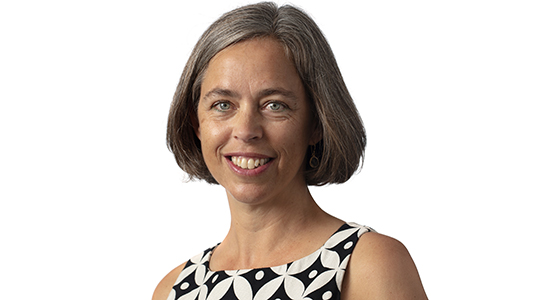Physical activity for a long and healthy life (FINE)
The aim of Project FINE was to identify factors that determine an individual's innate insulin sensitivity, and to investigate the effects of physical exercise on insulin sensitivity and energy balance as well as other metabolic parameters of health.
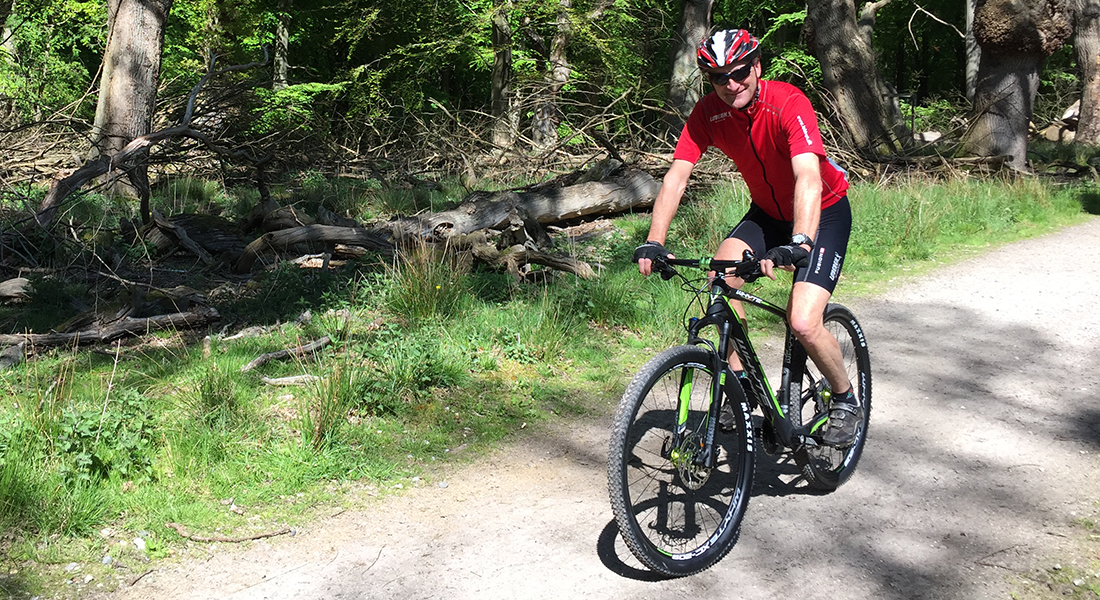
The knowledge obtained through the project could in the long term become diagnostically and therapeutically important for prevention and treatment of lifestyle-related diseases and lead to the development of suitable pharmaceuticals.
Project FINE was an interdisciplinary collaboration between four faculties at the University of Copenhagen and two hospitals in the Capital Region of Denmark. The clinical part of the project ran from December 2009 to July 2011.
Perspectives for Project FINE
Overweight can lead to obesity, and obesity can lead to type 2 diabetes, which has many serious complications, including cardiovascular disease. This downward spiral can and must be stopped; thus, it is important to learn how effective physical exercise can be in reducing overweight, and what mechanisms are behind this. The knowledge gained can be communicated to the population, and this will hopefully help to stop the obesity epidemic and its associated complications. In the longer term, the research may reveal "targets" that can be used in the development of preventative medicines.
Overweight and obesity - an epidemic?
The increase in the prevalence of overweight and obesity among all age groups in the Western world is so dramatic that the World Health Organisation (WHO) has classified it as an epidemic. Overweight is caused by a positive energy balance, which is partially due to a modern lifestyle that involves using forms of transportation that do not require physical exertion, working at sedentary jobs, and having a lack of physically active leisure pursuits in addition to regularly over-consuming food.
Overweight and lifestyle diseases
Overweight and obese individuals have a much higher risk of developing lifestyle diseases such as type 2 diabetes and cardiovascular disease, but the risk varies from person to person and cannot be explained only by differences in lifestyle factors. Thus, both genetic and epigenetic factors appear to regulate insulin sensitivity as well as beta cell function, and these conditions seem to determine an individual's likelihood for developing conditions later in life that are related to being overweight, such as diabetes and cardiovascular disease.
Physical activity is the key to a long and healthy life
Due to the rapidly increasing prevalence of overweight and obesity in modern society, there is now a growing focus on the fact that physical activity is a cornerstone of successful weight management. Health authorities in Denmark and a number of other countries recommend at least 30 minutes of daily physical activity, in order to prevent lifestyle diseases related to being overweight, and to add "years to life" as well as "life to years". However, at least 60 minutes of physical activity every day is recommended for overweight individuals who want to lose weight.
Objective
This study investigates overweight and physical exercise from the perspective of health promotion, and uses medical, scientific and humanities research methods. In our opinion, this variety of approaches is particularly relevant and innovative. Central to this study is the concept of health, which is defined by the WHO as "a state of complete physical, mental, and social well-being and not merely the absence of disease or infirmity."
Hypotheses
 The molecular mechanisms behind the large variation of insulin sensitivity within the population may essentially be attributed to differences in the molecular and structural conditions of skeletal musculature. This is investigated in subproject 1.
The molecular mechanisms behind the large variation of insulin sensitivity within the population may essentially be attributed to differences in the molecular and structural conditions of skeletal musculature. This is investigated in subproject 1.
The dose-response effects of physical exercise vary among different metabolic health parameters. Parameters related to the metabolism of skeletal musculature show a maximum response even with moderate doses of physical exercise, whereas parameters related to the metabolism of fatty tissue and the liver require high doses of physical exercise to achieve a maximum response. This is investigated in subproject 2.
Twelve weeks of high-dose physical exercise do not significantly affect the caloric intake of overweight men, which results in a negative energy balance in relation to the energy burned during exercise and thus weight loss. The energy use during 12 weeks of moderate-dose physical exercise is not great enough to significantly affect energy balance. This is investigated in subproject 3.
Identifying the social and cultural barriers to a change in behaviour and practice - as well as the health-promotion initiatives that have a positive effect - could contribute to the production of better strategies that encourage changes in health behaviour. This is investigated in subproject 4.
How the project was conducted
The study participants were divided into three groups after drawing lots, and each group participated in 12 weeks of either:
-
High-dose exercise (approx. 60 minutes per day)
-
Moderate-dose exercise (approx. 30 minutes per day)
-
No physical exercise
Before, during and after the test period, the participants were examined using a variety of techniques, ranging from high-tech PET-CT and MRI scans to low-tech food journaling and interviews.
The project will strengthen and develop the treatment of overweight
The study is expected to strengthen the platform for recommending lifestyle changes, and to contribute to the development of diagnostic markers and drugs for the prevention and treatment of diseases related to lifestyle factors.
Criteria
All the people who participated in the project met the following criteria:
-
Men between 20 and 40 years of age.
-
Moderately overweight, BMI = 25-30 kg/m2. Body Mass Index = weight (in kg) divided by height squared (m2).
-
Healthy and not regularly taking any medications.
-
No type 2 diabetes in their immediate families (parents and siblings).
-
Do not exercise regularly.
-
Caucasian (other ethnicities may increase data variation).
-
Do not suffer from anaemia: haemoglobin concentration ≥ 8.0 mmol/L.
The three test groups
After drawing lots, the participants in the exercise study were divided into 3 groups:
Group 1 - High-dose physical exercise
Participants in this group exercised 7 days a week with a calorie consumption of 600 kcal per exercise session. This was equivalent to approximately 1 hour per day. From previous studies, our experience was that this is a realistic goal. The participants were not asked to change their habits in any other way.
Group 2 - Moderate-dose physical exercise
Participants in this group exercised 7 days a week with a calorie consumption of 300 kcal per exercise session. This was equivalent to approximately ½ hour per day. The participants were not asked to change their habits in any other way.
Group 3 - Control group
Participants in this group continued to live as usual. That is, they did not change their exercise or dietary habits at all. After the test period, they were offered advice on exercise and diet, and a follow-up fitness test, if they wished.
Test period
The test period was approximately 15 weeks, and the exercise intervention period lasted 12 weeks. During the test period, the diet and activity levels of the participants were periodically registered. They also had to meet regularly at the Faculty of Health Sciences, the Panum Institute.
Before and after the test period, there was 1 long day of tests at Copenhagen University Hospital, and 4 shorter test days at the University of Copenhagen's Department of Human Nutrition (Frederiksberg), the Panum Institute and Glostrup Hospital.
Test schedule
Test day 1 at the Panum Institute (approx. 4 hours): The participants fasted prior to their arrival. Their body composition was measured using DXA (dual-emission X-ray absorptiometry) scans, and their sugar metabolism was measured after they drank 75g of a sugar solution. Their fitness levels were also measured using a cycling test.
Test day 2 at the Panum Institute (approx. 3 hours): The participants fasted prior to their arrival. They cycled for 1 hour at 60% of their maximum performance level, and then rested for 1 hour.
Test day 3 at Copenhagen University Hospital (approx. 10 hours): The participants fasted prior to their arrival. Their sugar metabolism was measured, and they each had two muscle and fat biopsies taken. After this, the sugar metabolism of their muscles was measured using a low-dose PET-CT scan.
Test day 4 at the Department of Human Nutrition (approx. 4 hours): The participants fasted prior to their arrival, but were served a morning meal and a lunchtime meal. After this, they were provided with all of their food for the next 8 days.
Test day 5 at Glostrup Hospital (approx. 2 hours): The participants fasted prior to their arrival in the afternoon, and the amount of fat in their stomachs and thighs was determined using magnetic resonance imaging (MRI) scans.
The tests also included taking blood and tissue samples. At the end of the test period, the participants each received DKK 7.000 in remuneration for their involvement in the project.
Subproject 1: The variation of insulin sensitivity in the population
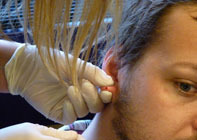
In the population as a whole, the effectiveness of the hormone insulin varies greatly. The objective of this part of the project was to identify the molecular mechanisms underlying the variation in insulin sensitivity. The consequence of a variation in insulin sensitivity is that the most insulin-resistant individuals have a concentration of insulin in their blood throughout the day that is 2 to 3 times higher than the most sensitive individuals, leading to the development of dyslipidaemia. This results in an increased incidence of arteriosclerosis and type 2 diabetes. The skeletal musculature is mainly responsible for dispersing carbohydrates after a meal; therefore, it is primarily in this tissue that the pathophysiological mechanisms of insulin resistance are expected to be identified.
Subproject 2: Dose-response effects of physical exercise
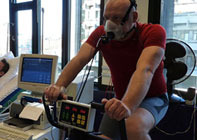
Physical exercise exerts dose-response effects, and in general, ‘the more, the better' applies. However, dose-response effects vary between different metabolic risk parameters (e.g., cholesterol levels, insulin resistance). Therefore, the maximum beneficial effect for a given parameter is not necessarily achieved at the same dose of physical activity as for a different parameter.
The objective of this part of the project was to identify and describe in more detail the mechanisms underlying the dose-response effects of physical exercise on metabolic health parameters, using both integrative and molecular techniques as well as self-evaluations of health.
Subproject 3: Physical exercise and energy balance
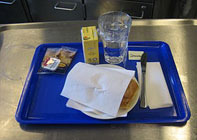
It is widely believed that physical exercise is not an effective method to induce weight loss because physical exercise stimulates caloric intake. However, very few human studies have investigated the long-term effects of physical exercise on caloric intake.
Therefore, the objective of this part of the project was to investigate how physical exercise influences the overweight men's caloric intake, body weight and appetite-regulating hormones as well as the composition of their diets and dietary choices.
Subproject 4: Cultural barriers to physical exercise
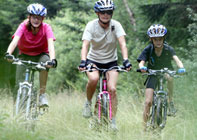
This part of the project used qualitative methods to focus on the test participants' motivations, experiences and potential barriers in relation to physical exercise.
The main objective was to identify the social and cultural ideas, expectations, and experiences related to the effects of exercise. An additional objective was to contribute social and cultural insights in order to qualify what it means to add not only ‘years to life' but also ‘life to years'. Furthermore, this subproject focused on the long-term effects of physical exercise on health and the quality of life as well as on how a user-perspective can be included in health promotion efforts in general.
Project FINE is a collaboration between a number of faculties and hospitals. The objective is to:
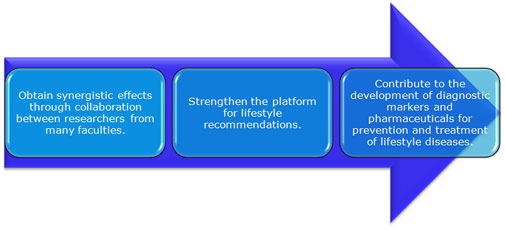
The FINE team and its collaborative partners aim at preventing and treating lifestyle diseases.
Faculty of Health Sciences (SUND)
Department of Biomedical Sciences: Professor Jens Juul Holst, professor Thomas Mandrup-Poulsen, professor Klaus Qvortrup.
SCIENCE
Department of Human Nutrition: Professor Lars Ove Dragsted.
Department of Food Science, Quality & Technology: Professor Søren Balling Engelsen
Faculty of Humanities
Saxo Institute: Associate Professor Astrid Pernille Jespersen.
Faculty of Pharmaceutical Sciences
Department of Pharmacology and Pharmacotherapy: Professor Harald S. Hansen.
Rigshospitalet
Metabolic Mass-Spectrometry Facility: Senior researcher Gerrit van Hall.
Department of Clinical Physiology, Nuclear Medicine & PET: Professor Liselotte Højgaard, Professor Andreas Kjær, Head physicist Søren Holm.
Glostrup Hospital
Functional Imaging Unit: Professor Henrik Larsson, Chief physician Egill Rostrup, Physicist Adam Espe Hansen
Project FINE has received funding from a number of foundations and funding providers
Food Fitness & Pharma
Food Fitness Pharma is a whole new type of research initiative where scientists broadly across the whole University of Copenhagen join forces in novel, synergy-promoting constellations and interdisciplinary approaches.
Center for Healthy Aging
Center for Healthy Aging, CEHA, is a research center at University of Copenhagen that focuses on interdisciplinary aging research for the advance of better health and reduced frailty.
The Novo Nordisk Foundation
The objective of the Novo Nordisk Foundation is twofold. To provide a stable basis for the commercial and research activities conducted by the companies within the Novo Group and to support scientific and humanitarian purposes.
- MB Blond, TM Schnurr, M Rosenkilde, JS Quist, AS Gram, MH Reichkendler, PL Auerbach, P Nordby, LT Skovgaard, R Ribel-Madsen, JM Justesen, TO Kilpeläinen, T Ploug, BM Stallknecht, and T Hansen. PPARG Pro12Ala Ala-carriers exhibit greater improvements in peripheral insulin sensitivity in response to 12 weeks of aerobic exercise training. Genomics 51: 254-60, 2019.
- M Rosenkilde, MH Reichkendler, P Auerbach, TC Bonne, A Sjödin, T Ploug, and BM Stallknecht. Changes in peak fat oxidation in response to different doses of endurance training. Scand.J.Med.Sci.Sports 25: 41-52, 2015.
- AP Jespersen, J Bønnelycke and HH Eriksen. Careful science? Bodywork and care practices in randomised clinical trials. Sociology of Health and Illness 36, 655-69, 2014.
- MH Reichkendler, M Rosenkilde, PL Auerbach, J Agerschou, MB Nielsen, A Kjaer, L. Hoejgaard, A Sjödin, T Ploug, and B Stallknecht. Only minor additional metabolic health benefits of high as opposed to moderate dose physical exercise in young, moderately overweight men. Obesity (Silver Spring) 22: 1220-32, 2014.
- AS Gram, J Bønnelycke, M Rosenkilde, M Reichkendler, P Auerbach, A Sjödin, T Ploug, A Jespersen and B Stallknecht. Compliance with physical exercise: using a multidisciplinary approach within a dose-dependent exercise study of moderately overweight men. Scand.J.Public Health 42: 38-44, 2014.
- AN Christensen, MH Reichkendler, R Larsen, P Auerbach, L Højgaard, HB Nielsen, T Ploug, B Stallknecht, and S Holm. Calibrated image-derived input functions for the determination of the metabolic uptake rate of glucose with [18F]-FDG-PET. Nucl.Med.Commun. 35: 353-61, 2014.
- M Reichkendler, P Auerbach, M Rosenkilde, A Christensen, S Holm, MB Petersen, A Lagerberg, H Larsson, E Rostrup, T Mosbech, A Sjödin, A Kjær, T Ploug, L Højgaard, and B Stallknecht. Exercise training favors increased insulin-stimulated glucose uptake in skeletal muscle in contrast to adipose tissue: A randomized study using FDG PET imaging. Am.J.Physiol.Endocrinol.Metab. 305: E496-506, 2013.
- M Rosenkilde, MH Reichkendler, P Auerbach, S Toräng, AS Gram, T Ploug, JJ Holst, A. Sjödin, and B Stallknecht. Appetite regulation in overweight, sedentary men after different amounts of endurance exercise: a randomized controlled trial. J.Appl.Physiol. 115: 1599-609, 2013.
- JS Kjeldsen, M Rosenkilde, SW Nielsen, MH Reichkendler, P Auerbach, T Ploug, B Stallknecht, AM Sjödin, and JP Chaput. Effect of different doses of exercise on sleep duration, sleep efficiency and sleep quality in sedentary, overweight men. Bioenergetics: Open Access, S1-002, 2012.
- M Rosenkilde, PL Auerbach, MH Reichkendler, T Ploug, BM Stallknecht, and A Sjödin. Body fat loss and compensatory mechanisms in response to different doses of aerobic exercise – a randomized controlled trial in overweight sedentary males. J.Physiol.Regul.Integr.Comp.Physiol. 303: R571-9, 2012.
- AP Jespersen. Kroppe i laboratoriet: Individuelle kroppe, forsøgskroppe og samfundskroppe i kliniske forsøg med overvægt. Kulturstudier 2, 119-141, 2011.
September 2013 - Publication by Anne Sofie Gram et al.
The publication "Compliance with physical exercise – using a multidisciplinary approach within a dose-dependent exercise study of moderately overweight men" led to press coverage in 16 Danish and 206 international media.
Here is a selection of the press coverage:
Politiken l 6 September 2013
Bevæg dig en smule og lev længe
Videnskab.dk l 18. september 2013
Let motion giver mere energi end hård træning
BT l 21. september
Let motion giver mere energi end hård træning
BT l 7. oktober 2013
Her er moderat motion bedre end hård motion
Firstpost l 19 September 2013
Just 30 minutes workout to stay healthy
Mail Online l 23 September 2013
Good news for couch potatoes: Exercising for half an hour helps you lose 25% MORE weight than going for a full hour
February 2013 - Article by Astrid Pernille Jespersen
On 15 February, dr.dk published the article 'Teknologi kan få folk op af sofaen' with comments from Astrid Pernille Jespersen.
December 2012 - Publication by Michala Holm Reichkendler et al.
The publication "Only minor metabolic health benefits of high as opposed to moderate dose physical exercise in young, moderately overweight men" led to press coverage in the following media:
Videnskab.dk l 21 December 2012
Så lidt motion gør dig sund
ScienceNordic l 21 December 2012
Couch potatoes don’t need to exercise like mad
Ekstrabladet l 19 December
Så lidt motion behøver du
August 2012 - Publication by Mads Rosenkilde et al.:
"30 minutes of daily exercise is enough" - During the last weeks, research results on physical activity obtained by PhD student Mads Rosenkilde from the Section of Systems Biology have received much attention in the press. In collaboration with Bente Stallknecht and a number of other researchers, Mads has found that 30 minutes of daily exercise leads to an equally effective weight loss as one hour of daily exercise.
Here is a selection of the press coverage:
Faculty of Health and Medical Sciences l 22 August 2012
30 minutters daglig motion er nok
TV2 Nyhederne at 19:00 l 22 August 2012
Motion i en halv time giver større vægttab end i en time
TV2 Nyhederne at 22:00 l 22 August 2012
30 minutters motion er nok
Dr.dk l 22 August 2012
Ny forskning: Mere motion giver mindre vægttab
Politiken.dk l 22 August 2012
Forskere: Mads Rosenkilde i Politiken
Jyllandsposten l 22 August 2012
En halv times motion kan være nok
Videnskab dk l 22 August 2012
30 minutters daglig motion er nok
The Daily Telegraph l 23 August 2012
30 minutes exercise 'better than an hour of training' for weight loss
Daily Mail l 22 August 2012
Forget that long workout chaps: Men who exercise for half an hour a day lose more weight than those who train for twice that time
Radio Interviews:
P4-radioavisen at 15:00
22 August 2012
Interview with Bente Stallknecht
P4 at 17:20
22 August 2012
Interview with Mads Rosenkilde
February 2011 - Radio interview with Pernille Auerbach and Julie Bønnelycke
Pernille Auerbach and Julie Bønnelycke were invited to participated in the radio show 'DR Sundhed' 19 February 2011 where they talked about 'Excess weight - Questions and answers'.
February 2011 - Article by Bente Stallknecht
Bente Stallknecht published the article 'Når overvægt fører til farlig fedme' in 'DR Sundhed'.
January 2011 - Article by Bente Stallknecht and Astrid Pernille Jespersen
Bente Stallknecht and Astrid Pernille Jespersen published the article 'Overvægtige mænd ligeglade med sundhedskampagner' in 'Politiken'.
October 2010 - Article by Julie Bønnelycke and Astrid Pernille Jespersen
Julie Bønnelycke and Astrid Pernille Jespersen have published the article 'Hvordan kommer sundhed ud af laboratorierne og ind i stuerne' (s. 4-7) in the magazine 'Humanist'.

